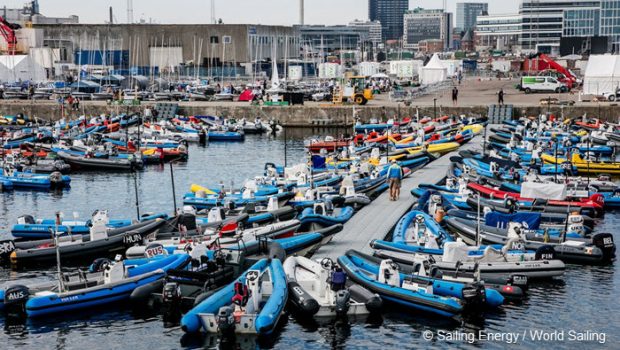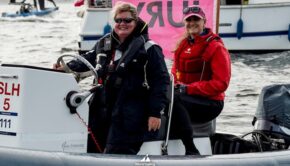Putting the green back into sailing
Published on August 12th, 2019
The pursuit of success at high-level events has seen a rise in ancillary support powerboats which is impacting the “greenness” of the sport. In reaction to this trend, World Sailing, the world governing body of the sport, has set an ambitious challenge to the marine industry to push the boundaries of low carbon innovation for support boats at international events.
Titled Challenge 2024 and announced at Monaco Yacht Club’s Solar and Energy Boat Challenge, it is closely linked to World Sailing’s Sustainability Agenda 2030 targets.
The targets are linked to the use of coach and support boats with the aim to:
• Reduce the number of coach boats with combustion engines by 50% (vs 2017) that are allowed at World Sailing organized Olympic Class events by 2024. This will be safety dependent;
• Specify that all official boats (safety dependent) used at World Sailing organized Olympic Class events will not be solely reliant on fossil fuels for propulsion by 2025.
Scott Over, World Sailing’s Commercial Director, presented at the Solar and Energy Boat event a business and environmental case for a shift from traditional combustion engines on support boats.
Research has shown that the emissions from fuel used at World Sailing’s events accounted for almost 30% of its overall carbon footprint.
Over presented alongside Formula E who have accelerated investment from the automotive sector in electric technologies. The aim is that this model can be applied to the wider marine industry, not just World Sailing events, so similar boats can be utilized for rescue and recreational activities.
Challenge 2024 parameters are based on data collected by World Sailing and its partners along with research from leading marine institutions such as Southampton University and TU Delft. The parameters for the desired boat include:
• RIB to be approximately 6 metres
• Non-combustible engine
• Version designed to be shipped – stackable with a removable console
• An eight hour range with an average speed of 10 knots and maximum of 30 knots
• Life cycle assessment to be applied to the build
• Affordable
“We want to challenge the industry to provide solutions that will reduce the carbon footprint and running costs of support boats at sailing events,” said Dan Reading, World Sailing’s Head of Sustainability. “Our members have agreed to policy changes to reduce the number of support boats at our events but we also want to encourage a low carbon fleet developed that are accessible to all.
“Looking at the whole Life Cycle Analysis is an essential part of the puzzle, and drawing on research we feel confident that solutions will be in place by 2024.
“We are encouraged that the Dutch Sailing Team have already expressed their bold commitment to use zero emission RIBs in the 2022 World Championships in The Hague. We also share an ambition with the Paris 2024 Olympics and will be working together on how we can both help with the transition to low carbon support boats.
“Adding further momentum to this challenge and contributing to World Sailing’s Sustainability Agenda 2030 is SailGP who recently released an FRP detailing their ambition to source hybrid boats for a range of purposes.
“Challenge 2024 is one of the initiatives that World Sailing is delivering in line with its participation in the UN Climate Change’s Sport and Climate Action Framework along with other sport events such the IOC, Paris 2024, World Surf League, SailGP, and all the tennis grand slams.”
Georgina Grenon, Director of Environmental Excellence at Paris 2024, noted how Paris 2024 is engaged in delivering a fully carbon neutral Olympic and Paralympic Games. “The Organizing Committee is seeking innovative solutions that will contribute to reduce the Climate and Environmental impact of sports activities, and reducing the use of combustion engines is clearly a target,” said Grenon.
“An important first step in that direction has started in July 2019, with the launch (in collaboration with the French State) of a call for projects to replace diesel-generators with eco-generators for provision of temporary and back up electricity services. Naturally, land transport fleets for the Olympic family and support fleets for water sports should follow.”
Boat builders, engineers and any other experts within the field are requested to contact Dan Reading, Head of Sustainability, at Dan.Reading@sailing.org.
Sustainability Agenda 2030:
Ratified at World Sailing’s 2018 Mid-Year meeting in London, World Sailing’s Sustainability Agenda 2030 outlines how the sport will contribute to the United Nation’s Sustainable Development Goals.
The Sustainability Agenda 2030 is split up into World Sailing’s six main operational areas with a total of 56 different targets. The targets range from participation to gender equality, water quality to single use plastic.
Supported by the International Olympic Committee and World Sailing’s partners, delivery of the Sustainability Agenda 2030 will be ongoing with various timeframes for achievement of the targets.
Details: https://www.sailing.org/about/Sustainability.php.
Source: World Sailing









 We’ll keep your information safe.
We’ll keep your information safe.